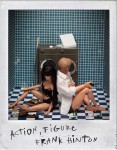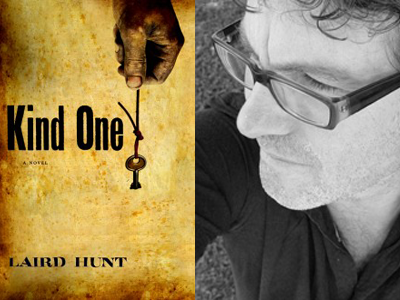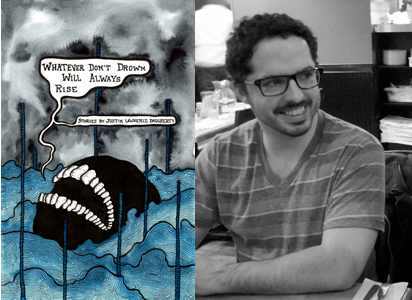


Frank Hinton hides behind beautiful things with hopes that people will look there and admire the beauty of the thing and not s/he who trembles behind it. Frank believes in the magic within the mundane and feels fiction is just right for that kind of voodoo. Frank also edits Metazen, a daily fiction journal. Frank is not her real name.
Monkeybicycle: Why the pseudonym? And how much of you as “Frank” is a part of the “Frank” character in Action, Figure?
Frank Hinton: I think originally because of my job and the small community that I lived in I felt the need to use a pseudonym. Before Metazen was a daily litzine it was an infrequently updated blog where I would post weird ideas or fragments of stories. I didn’t want to be connected with my ideas because I think that I felt embarrassed about that side of myself. When I internally declared I was a writer I found an entire part of myself that wanted things hidden or half-revealed. I was also neurotic about people reading my thoughts. But then, maybe four years ago I became aware of online writers Finnegan Flawnt (Marcus Speh) and xTx and I saw what they were doing with their pseudonymity and found it intriguing. I started building the concept of a writer that exists in and out of stories that is wholly me and also not me. The internet+fiction allowed me to play with the idea of a character that exists and doesn’t exist. A lot of my early stories featured Frank and Lili and my novel predominantly featured them. I like the idea of a male and a female so much because I feel that my professional online personality ecompasses both. I really think that my most authentic self is represented in Frank Hinton. There is a very enchanting thing about having a vague online personality. I think as long as I am positive and supportive of others and because I don’t catfish people, that I am ok. In my real life I can say probably 80% of what happens in the book is directly ripped from events I’ve experienced (not the Rapunzel sections). I twisted things around a bit but I feel like I am deeply woven into the Lili and Frank segments of the book. Those are my experiences.
Mb: One of the three focal points of the book is Frank’s inability to move on after university: “Seems like, there’s nothing out there. But I feel good because if I get a job then I have to sort of ride to my death. Job, family, career, divorce, alimony, death.” What is it about growing up that scares us so much, and why is it so ripe for writing?
FH: I don’t know. I remember finishing University, I did my undergrad and then a Masters all in a six year shot. I seemed to have had a plan for everything up until I finished University. I knew what I wanted to do for work and I was reasonably confident I would achieve that. I think that you go to school for 19 years and obviously the identity of ‘student’ is more you than the identity of ‘professional’ or ‘adult’. I had finished my education and I didn’t feel like being a professional adult, I think I really felt the coziness of independent study, ruthless reading sessions, hours in the library, and the comradery of student-peers all slide away in an instant upon graduation. I stayed in my apartment in my University town for three additional months because I couldn’t stand the thought of leaving for the grown-up world. I still kind of ache for that old time now and I think a lot of people ache for it. It has been written about a lot, but I think it was probably therapeutic for me to try and capture it in fiction.
Mb: Particularly in the Frank and Lili sections, there is much attention paid to various acts of sex, but those moments are often hollow, seemingly unencumbered by emotional connection. How important is the separation of sex and love in Action, Figure?
FH: I think the initial thread in my mind when I started piecing together the manuscript was: What is the lowest form of emotional contact two people need to share and still be in a relationship? Probably my most interesting relationships have been the ones I didn’t consciously understand. There were times in my life where I didn’t know if I was dating a person and didn’t know if that person even really liked me. I’ve had a few of those. We’d end up in bed together and the sex in that kind of relationship is so mystifying because there is a barrier between you and yet you are intimately entwined with one another. Your brain thinks weird things. So the Frank and Lili thing is essentially based on a relationship I had with a roommate in University that I think I was probably in love with but the nature of how we related to one another was so emotionless and convoluted that we were unable to define anything beyond physical attachment. It was amazing in the sense that everything was abstract. And the best thing I think was that I never questioned it because I didn’t want to pop that bubble. I liked the strange physics of the entire process we shared. My roommate was in a serious relationship, I was in a serious relationship and yet we would somehow abandon our ‘mature, adult relationships’ and go into this amazing unknowable place with one another. I guess the fact that we were also both cheating on our partners added excitement as well.
Mb: Drugs likewise play a prominent role in the novel, often leading or allowing the characters to disengage with the world. Is this just a different facet of growing up, or is it inherent in all of us, the need to escape, to disappear if only for a moment?
FH: For me, drugs represent a way to ignore adulthood and maturity. People don’t play with toys or have recess after a certain point in their lives. We’re just constantly told to act like adults. I think a lot of sportive people are successful because they are able to play games their entire lives, but I am not a sportive person. I jog and I ski but aside from that there is little to distract me from adulthood. I think drugs are a way for people to enter into childlike states wherein your mind becomes playful again. You take joy in simple and slow things, you reminisce, you wonder. At the same time, you can go overboard with that kind of distraction. Lili’s story is really about her having a relapse. She starts out the novel feeling clean and happy about herself and the addict-mind tells her to reward herself. So the first few chapters she gives herself innocent rewards but then she takes it too far and ends up rewarding herself into a relapse of hard drugs and purging. I wanted to try and capture that feeling of the pendulum ‘in swing’, from something stable into something abysmal.
Mb: “Language is not the way to convey anything. The only thing you have is yourself. You are enough. Stop. You are not enough. You don’t deserve your treats.” How vital is the issue of self-worth in Action, Figure?
FH: There is something of a philosophy in that line. I know that in my lowest times I have believed I was worthless and pitiful. Paradoxically, the most empowering mantra I’ve used in meditation has been saying over and over ‘I am nothing, I am nothing’. I remember the first time I felt I’d achieved a meditative state was after that repetition. It is hard to explain a meditative state because essentially my ego is describing a time when I felt an egolessness. Basically, I think I was able to perceive myself beyond words and in a very pure and calm state. I remember getting up and walking through the hallways of my dorm and just feeling humble and so joyous. I have only been able to reproduce that meditative state twice more in my life and although the book doesn’t focus on meditation, I think that maybe a subtext to all three narratives is me yearning for that state. I want to go to that place where I am nothing, and that is beautiful. All the bullshit I heap into my thought processes gets me into the kind of states I wrote about in the book, but there is a clarity and peace that I continually am searching for.
Purchase a copy of Action, Figure here, & read more from / about Frank Hinton here.
J. A. Tyler is the author of nine novel(la)s of poetic fiction. His work has been published in Black Warrior Review, Redivider, Cream City Review, Diagram, Fairy Tale Review, Columbia Poetry Review, and New York Tyrant. He also runs Mud Luscious Press.


